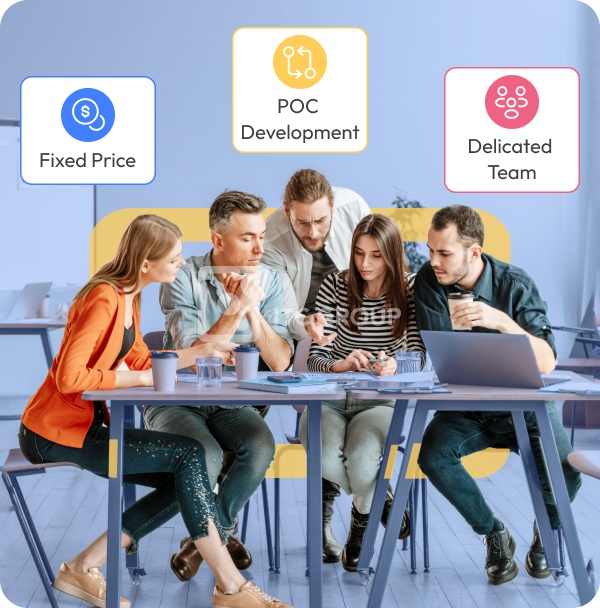Explore Our Proven Engagement Models Up Close
With our well-crafted engagement models, we can get your product to grow, and pursue excellence.
Dedicated Team
Business context
- Don’t have a fixed scope.
- Don’t have clear software specification requirements.
- Organize large, complex, long-lasting strategic projects.
- Organize projects with constant workflow.
- Security and confidential information guarantee.
- Complicated communication and exchange.
Model mapping
- Provide mandatory information about our team.
- Collect, analyze, and clarify clients' requirements.
- Provide a rough estimate of the project.
- Work on the committed time frame.
- Ensure the quality and security requests.
Fixed-fee
Business context
- Clear requirements and scope of the project.
- Constraints on approved budget and timeline.
- User Acceptance Testing (UAT) team to verify and confirm the working software.
- Focus on MVP development
- Don’t want to be involved in the project-based software development process
Model mapping
- Ready for discussion to reach the official requirements.
- Mutual agreement for a fixed time, and cost.
- Progress reports and client approval.
POC Development
Business context
- Identify potential technical and logical issues.
- Need more tests and feedback from internal or external stakeholders.
- Reduce risk and get more evidence for full project approval.
Model mapping
- Identify clear criteria for success.
- Identify a proposal on how to move forward should the PoC prove to be successful.
- Ready for any discussion and change about project requirements.
- Cost and timeline are estimated for the work done.
Frequently Asked Questions
Question 1: What is an engagement model?
An engagement model serves as a structured framework that outlines how we collaborate. It establishes the extent of control and accountability while also laying the foundation for fostering a deeper and evolving relationship.
Question 2: What are the benefits of engagement models?
Engagement models offer several benefits, including improved communication, clarity, accountability, scalability, cost-efficiency, and the potential for long-term sustainable relationships, ultimately contributing to better outcomes for all involved parties.
Question 3: What are the technologies that you offer?
Our team includes experts in front-end, back-end, and full-stack development. Furthermore, we have developers well-versed in cutting-edge technologies such as cloud computing, data science, artificial intelligence, machine learning, and more.
Question 4: Why should I choose ITC Group?
ITC Group, with a substantial track record spanning numerous years, has fostered partnerships with companies of varying sizes, ranging from startups and robust enterprises to agile SMEs, and product-focused companies, ensuring your path to success is well-guided.
Frequently Asked Questions
Question 1: What is an engagement model?
An engagement model serves as a structured framework that outlines how we collaborate. It establishes the extent of control and accountability while also laying the foundation for fostering a deeper and evolving relationship.
Question 2: What are the benefits of engagement models?
Engagement models offer several benefits, including improved communication, clarity, accountability, scalability, cost-efficiency, and the potential for long-term sustainable relationships, ultimately contributing to better outcomes for all involved parties.
Question 3: What are the technologies that you offer?
Our team includes experts in front-end, back-end, and full-stack development. Furthermore, we have developers well-versed in cutting-edge technologies such as cloud computing, data science, artificial intelligence, machine learning, and more.
Question 4: Why should I choose ITC Group?
ITC Group, with a substantial track record spanning numerous years, has fostered partnerships with companies of varying sizes, ranging from startups and robust enterprises to agile SMEs, and product-focused companies, ensuring your path to success is well-guided.
Trusted by 150+ Clients Worldwide
























